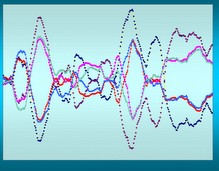Here is a picture of INTC - pick out bases -

I'll help

Ok - at what point can we say that the stock is basing? Take "a" for example - do we say it is basing after the second week or the third or the fourth - even though the fourth is actually the first week of the breakout and new trend?
Is "b" really a base and if it isn't, why not? Where did the "c" base begin and what do we call the period between "c" and "c'" - a "hump"? Was there a base between "c'" and "d" - in September? Is "d" really a base and if it isn't what should we call it - a "plateau"? But would we know that before it ended?
Here's GOOG - again with some help -

Again - is "a" a base and are "b", "c", and "d" or only "e"? And how long should a base last?
I'm not picking on you Tom I'm just suggesting that the concept of "basing" is faulty at best and because it can't be measured I never use it. I prefer to say that a stock is trending or not trending. And the only stocks I'm interested in are those in a trend.
And the other thing that I've noticed over 40 some odd years of watching the stocks is that the longer a stock "bases" the higher the probability that it goes down. The reason for that is - most people are only interested in stocks that trend and they grow tired of those that don't.
I'm probably 100% wrong about GOOG because unlike my wiser brethren I freely admit that I don't know anything. And I prove it daily in this BLog.

2 comments:
Great post! Thank you. I appreciate it. Loved the setup for 'I'll help.'
GOOG? GOOG is just weird.
Nothings more diffcult than attempting to pick a bottom.
Post a Comment